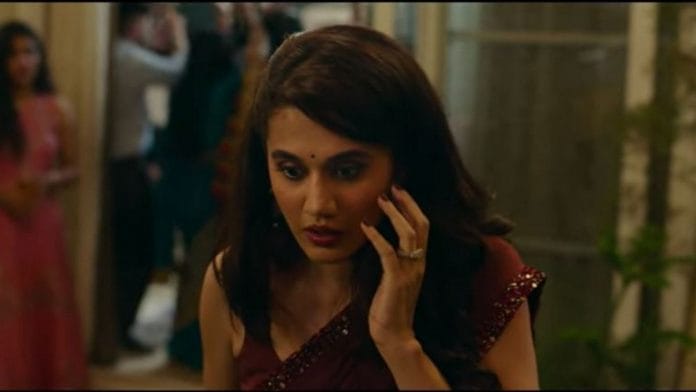“It’s only a slap, na. Get over it.”
It’s something many of us have heard at home, outside, with friends, in films. But how can it just be a slap? Irrespective of its magnitude, which is itself debatable, isn’t even a single slap an act of violence? And nobody has the right to subject someone else to violence of any kind. We all agree on that. And yet, violence is so much a part of our way of life. Anubhav Sinha’s Thappad explores this pervasive violence and how we react to it in a nuanced, yet simple, and very powerful way.
Thappad tells the story of Amrita (Taapsee Pannu) and Vikram (Pavail Gulati), a married couple living in upscale Delhi, with Vikram’s mother. Amrita is an efficient homemaker, who is very happy with her life and loves her ambitious, loving husband. Everything is picture perfect until that one moment when, in a fit of rage, Vikram slaps Amrita. For the remainder of the two hours, the audience is shown how we — women, men, rich people, poor people, Indians — how we all react when we see violence we know is wrong.
As the trailer shows, Amrita files a petition against Vikram for slapping her and is faced with what every woman who has ever stood up for herself has faced. She is told to move on, that this happens all the time, that these “choti-moti baatein” (small, insignificant things) happen between man and wife. She is gaslit, blamed, emotionally blackmailed and patronised by those around her. But Amrita remains steadfast in her one, simple belief — he had no right to hit her.
Written by Sinha and Mrunmayee Lagoo, the film does a genius job of explaining the silent suffering of women in a way that even men can understand. It takes this seemingly simple incident and lays bare the complex system of patriarchy, misogyny and violence that support it.
The dialogues, again simple and not dramatic, are what make the film a stark, powerful mirror to society. It is in lines where Amrita’s parents (played by Ratna Pathak Shah and Kumud Mishra) try and console their daughter, by saying it’s an internal matter she should sort out with Vikram, where it hits you — why should she sort it out?
She is told that she will be branded a divorcee, a home-breaker, a woman who was selfish enough to think about herself when her husband was miserable. She is asked to deal with it quietly, not in front of people and not so brazenly, because what will people say? These are words we all hear every day and accept without realising how they rob women of agency.
Also read: From DDLJ to Dil Chahta Hai, Bollywood has one act to thank — that one tight thappad
More than anything, however, Thappad is the story of all Indian women and their silent suffering, which seems to be inbuilt. The film focuses on Amrita, but also juxtaposes her story with those of the women around her. The domestic help, Sunita, who is beaten up every day by her drunk husband; Amrita’s hot-shot lawyer, who is trapped in an unhappy marriage with a pompous, patronising man; Amrita’s mother and mother-in-law — women who never had an avenue to even question anything done to them.
By showing women of different levels of privilege and with different mindsets, the writers smartly depict how, no matter how privileged you might be, just the fact of being a woman and suffering the discrimination therein, is a kind of equaliser.
The performances are also what bring this hard-hitting tale to life. Pannu does a great job bringing out Amrita’s inner turmoil with just silence and minimal dialogue. She is shell-shocked but determined to get justice for this gross violation. Gulati also does a great job portraying a man who is blinded by privilege and the patriarchal system he lives in. Shah, Mishra and Tanvi Azmi do well as supporting actors, and Maya Sarayo, who plays Amrita’s lawyer, beautifully portrays an ambitious woman slowly getting disillusioned about her life and marriage.
Thappad will make audiences — especially men — uncomfortable and squirm in their seats as it very quietly shows the privilege they take for granted, irrespective of how ‘woke’ they are. In all its understated glory, the film will speak to every woman, irrespective of the degree of violence she may have faced in life. But most importantly, it will change the way you react to violence and will stay with you long after you’ve left the theatre.
Also read: Domestic violence top crime against women, sedition cases doubled in 2018: NCRB data







Lol, how are people trying to question what happens if woman slaps.. No one has the right to hit anyone. period.
If a man slaps it’s a issue sympathy to them… What if woman slaps to man no film is there nothing about men.. No society or anything still men are blamed think about both sides you all lame duck feminists jerk. It’s totally biased film
Men do not have right to hit women( this wife) then who gave women right to slap men and why should happen if a wife slaps her husband. Should he also file a case against her???? It’s not justified because there is always two sides of a coin and one must not neglect the other side also.
Nobody has a right to hit anybody. It is violence. There is no such thing as a small slap. And yes, if the wife hits, the husband can (and should) take recourse to the law. Why shouldn’t he? Unless he is also worried about “Log kya kahenge”!